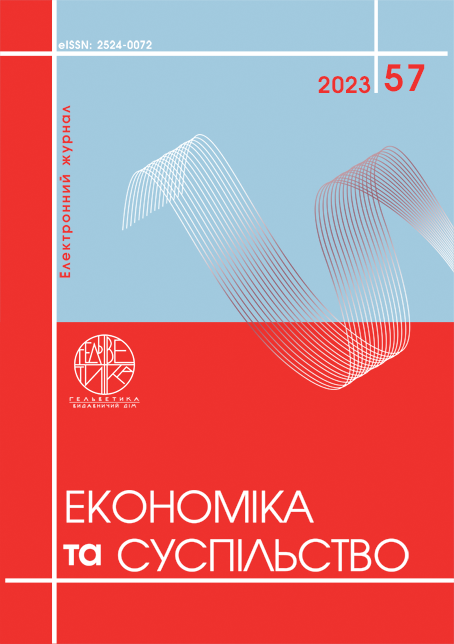ОСОБЛИВОСТІ ЗЕЛЕНОГО ЗРОСТАННЯ ЕКОНОМІКИ В КРАЇНАХ, ЩО РОЗВИВАЮТЬСЯ
Анотація
У статті досліджено специфічні характеристики зеленого економічного зростання в країнах, що розвиваються. Враховано контекстуальні відмінності країн, що розвиваються, зокрема, велику частку тіньової економіки, високу залежність від природного капіталу, високий рівень бідності та нерівності, у зв’язку з чим вирішення екологічних проблем має низький пріоритет. Проілюстровано розподіл викидів парникових газів між секторами у світі та в країнах, що розвиваються. Проаналізовано кліматичне фінансування країн, що розвиваються, беручи до уваги багатосторонні та двосторонні домовленості, експортні кредити та залучення приватних коштів. На основі проведеного аналізу, зроблено висновки про значне зростання фінансування кліматичних ініціатив в країнах, що розвиваються, яке, проте залишається на нижчому, від запланованого, рівні. Визначено роль фінансових установ з питань розвитку для розблокування приватних ресурсів та розширення участі приватних інвесторів у зеленій економіці країн, що розвиваються.
Посилання
Зварич Р., Масна О., Рівіліс І. Методологічні засади формування концепції зеленої економіки. Вісник Економіки. 2022. № 4. DOI: https://doi.org/10.35774/visnyk2022.04.131
Орловська Ю., Дригола К., Балтакса Г. Теоретичний бекграунд зеленої економіки в рамках світової парадигми сталого розвитку. Збірник наукових праць Економічний простір. 2020. № 160. С. 23–27.
Сич К., Бугайчук В., Грабчук І. Тенденції та перспективи розвитку зеленої економіки в Україні. Економіка та суспільство. 2021. №30. DOI: https://doi.org/10.32782/2524-0072/2021-30-48
Barbier B. E. Is Green Growth Relevant for Poor Economies? Development Policies. 2015. Working paper No. 144. 28 p. URL: https://ferdi.fr/dl/df-9YpSggBpToy9PGHg3pZp3CKS/ferdi-p144-is-green-growth-relevant-for-poor-economies.pdf
Climate Change and the Cost of Capital in Developing Countries. Assessing the impact of climate risks on sovereign borrowing costs. UN Environment. 2018. 38 p. URL: https://eprints.soas.ac.uk/26038/1/ClimateCostofCapital_FullReport_Final.pdf
Daniek K. Green economy indicators as a method of monitoring development in the economic, social and environmental dimensions. Social Inequalities and Economic Growth. 2020. Vol. 2, No. 62, p. 150–173. DOI: https://doi.org/10.15584/nsawg.2020.2.10
Introduction to Climate Finance. UNFCCC. 2021. URL: https://unfccc.int/topics/climate-finance/thebig-picture/introduction-to-climate-finance
Lehmann P., Söderholm P. Can technology-specific deployment policies be cost-effective? The case of renewable energy support schemes. Environ Resour Econ. 2018. Vol. 71. P. 475–505.
Nationally determined contributions under the Paris Agreement. Conference of the Parties serving as the meeting of the Parties to the Paris Agreement. Third session, Glasgow. UNFCCC. 2021. URL: https://unfccc.int/sites/default/files/resource/cma2021_08rev01_adv.pdf
Söderholm P. The green economy transition: the challenges of technological change for sustainability. Sustainable Earth. 2020. Vol. 3, No. 6. DOI: https://doi.org/10.1186/s42055-020-00029-y
Spath N., Xia T. Between economic growth and climate change: supporting developing countries reach sustainable, climate-smart development. Deutsche Investitions und Entwicklungsgesellschaft. 2022. URL: https://www.deginvest.de/DEG-Dokumente/Über-uns/Was-wir-bewirken/Between-economic-growth-and-climate-change_paper.pdf
Statement from OECD Secretary-General Mathias Cormann on Climate Finance in 2019. OECD. 2021. URL: https://www.oecd.org/environment/statement-from-oecd-secretary-general-mathiascormann-on-climate-finance-in-2019.htm
Statement on Climate and Energy Finance. EDFI. 2020. URL: https://edfi-website-v1.s3.frpar.scw.cloud/uploads/2020/11/1.-EDFIStatement-on-Climate-and-EnergyFinance-Final.pdf
Tawiah V., Zakari A., Adedoyin F.F. Determinants of green growth in developed and developing countries. Environmental Science and Pollution Research, 2021. Vol. 28. DOI: https://doi.org/10.1007/s11356-021-13429-0
Zvarych R., Masna O., Rivilis I. (2022) Metodologhichni zasady formuvannja koncepciji zelenoji ekonomiky. Visnyk Ekonomiky, No. 4. DOI: https://doi.org/10.35774/visnyk2022.04.131 (in Ukrainian)
Orlovsjka J., Dryghola K., Baltaksa G. (2020) Teoretychnyj bekghraund zelenoji ekonomiky v ramkakh svitovoji paradyghmy stalogho rozvytku. Zbirnyk naukovykh pracj Ekonomichnyj prostir, No. 160. 23-27. (in Ukrainian)
Sych K., Bughajchuk V., Ghrabchuk I. (2021) Tendenciji ta perspektyvy rozvytku zelenoji ekonomiky v Ukrajini. Ekonomika ta suspiljstvo, Vol. 30. DOI: https://doi.org/10.32782/2524-0072/2021-30-48 (in Ukrainian)
Barbier B. E. (2015) Is Green Growth Relevant for Poor Economies? Development Policies. 2015. Working paper No. 144. 28 p. Available at: https://ferdi.fr/dl/df-9YpSggBpToy9PGHg3pZp3CKS/ferdi-p144-is-green-growth-relevant-for-poor-economies.pdf
Climate Change and the Cost of Capital in Developing Countries. Assessing the impact of climate risks on sovereign borrowing costs. UN Environment. 2018. 38 p. Available at: https://eprints.soas.ac.uk/26038/1/ClimateCostofCapital_FullReport_Final.pdf
Daniek K. (2020) Green economy indicators as a method of monitoring development in the economic, social and environmental dimensions. Social Inequalities and Economic Growth. Vol. 2, No. 62, p. 150-173. DOI: https://doi.org/10.15584/nsawg.2020.2.10
Introduction to Climate Finance. UNFCCC. 2021. Available at: https://unfccc.int/topics/climate-finance/thebig-picture/introduction-to-climate-finance
Lehmann P, Söderholm P. (2018) Can technology-specific deployment policies be cost-effective? The case of renewable energy support schemes. Environ Resour Econ. Vol. 71. P. 475–505.
Nationally determined contributions under the Paris Agreement. Conference of the Parties serving as the meeting of the Parties to the Paris Agreement. Third session, Glasgow. UNFCCC. 2021. Available at: https://unfccc.int/sites/default/files/resource/cma2021_08rev01_adv.pdf
Söderholm P. (2020) The green economy transition: the challenges of technological change for sustainability. Sustainable Earth. Vol. 3, No. 6. DOI: https://doi.org/10.1186/s42055-020-00029-y
Spath N., Xia T. (2022) Between economic growth and climate change: supporting developing countries reach sustainable, climate-smart development. Deutsche Investitions und Entwicklungsgesellschaft. Available at: https://www.deginvest.de/DEG-Dokumente/Über-uns/Was-wir-bewirken/Between-economic-growth-and-climate-change_paper.pdf
Statement from OECD Secretary-General Mathias Cormann on Climate Finance in 2019. OECD. 2021. Available at: https://www.oecd.org/environment/statement-from-oecd-secretary-general-mathiascormann-on-climate-finance-in-2019.htm
Statement on Climate and Energy Finance. EDFI. 2020. Available at: https://edfi-website-v1.s3.frpar.scw.cloud/uploads/2020/11/1.-EDFIStatement-on-Climate-and-EnergyFinance-Final.pdf
Tawiah V., Zakari A., Adedoyin F.F. (2021) Determinants of green growth in developed and developing countries. Environmental Science and Pollution Research, Vol. 28. DOI: https://doi.org/10.1007/s11356-021-13429-0

Ця робота ліцензується відповідно до Creative Commons Attribution 4.0 International License.


